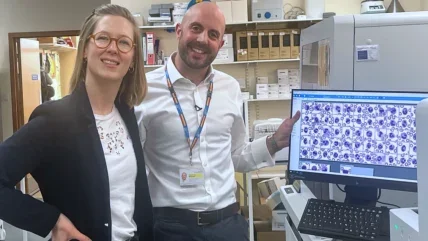
Scientists at the University of Exeter in the UK have developed a new method to interpret standard blood tests, aimed at helping general practitioners (GPs) detect early warning signs of cancer.
The test is now being integrated into a National Health Service (NHS) trust, with the Royal Devon University Healthcare NHS Foundation Trust becoming the first to adopt this new algorithm for routine blood analysis.
According to the University of Exeter, the test identifies changes in raised blood platelet levels in a more customised way, allowing GPs to investigate concerns more effectively.
Each year, the Royal Devon processes about 500,000 blood tests with platelet readings. In Devon, blood tests are processed through hospital-based labs.
The new algorithm will be trialled at five GP practices or medical centres in the county.
The University of Exeter’s blood test aims to flag 500 patients with raised platelets annually, with about 20 potentially having cancer detected earlier. If a patient’s platelet count is high, the GP will be notified and provided with clear guidance on the next steps for investigation.
The initial two-year pilot, with staged regional expansion, aims to flag 10,000 patients annually if rolled out across the NHS. Early detection of raised platelet counts could lead to earlier cancer diagnoses and improved patient outcomes, the University of Exeter said.
Royal Devon University Healthcare (RDUH) NHS Foundation Trust Blood Sciences Laboratories pathology clinical director Tim McDonald said: “It’s actually very simple for us to add to the routine tests we’re already conducting, and we hope it will mean that GPs can catch cancer in some patients earlier, which we know leads to the best outcomes.”
The study, High or Elevated Level of Platelets (HELP) Flag project, used anonymised electronic health records to study patients with blood tests. Researchers tracked diagnoses of cancer, its type, and how it was detected.
It analysed data from over six million adults in Canada, England, and Australia.
The University of Exeter, Peninsula Cancer Alliance, and RDUH are evaluating the new test through the National Institute for Health and Care Research (NIHR) Exeter Biomedical Research Centre and Exeter HealthTech Research Centre.
The study aims to assess how effectively the test triggers earlier cancer diagnoses and to expand the approach if successful.
UK Minister for Public Health and Prevention Andrew Gwynne said: “These advanced algorithms into routine blood tests are empowering GPs in Devon with tools to catch cancer warning signs earlier, paving the way for earlier diagnoses and better outcomes for patients.”






